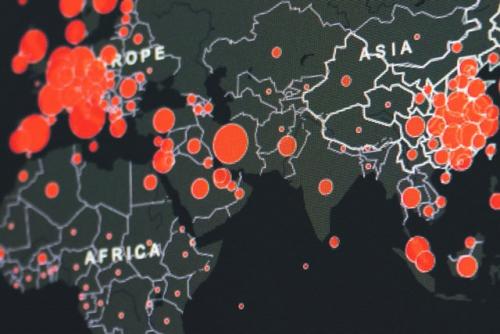Future civic spaces and digital innovation

The shrinking of civic spaces in many countries over the past year has raised global concern. Civil society organizations need more support from the international community to continue working and protect freedoms of association, peaceful assembly, and expression. The COVID-19 situation is still unpredictable across the world. That presents many governments with an opportunity to reduce physical civic spaces, forbid civil society activities, and implement more restrictions for freedom of movement and assembly.
Existing challenges for physical civic spaces
Restrictions on civic spaces are unjust. The shrinkage of civic spaces leads to more limitations on activism and peaceful protest for individual rights and freedom. With the ongoing pandemic and developments of new strains of COVID-19, the future for physical civic spaces becomes an issue that must be tackled by peacebuilding organizations. If there is no civic space, civil societies will lose their voice, and just peace cannot be sustained.
A hopeful future for civic spaces?
Nevertheless, an interesting new opportunity has arisen. The digital transformation is undeniably an impactful change for civil society to use as an advantage in reducing the shrinkage of civic spaces. Even though digital technology is a new avenue for extending civic spaces, the control of advanced technology by private companies is still an issue for civil society organizations (CSOs). CSOs need to have independent usage. Digital platforms can raise security risks. Equal access to available technology is needed.
According to the digital civic spaces and digital transformation report 2020, there are four plausible futures that civic spaces might face by 2030: civic spaces could collapse; civic spaces could flourish; civic spaces could transform itself; or civic spaces could break apart.
Digital transformation has a role in any of these plausible futures. Digital technology can be used to advance the transformation of physical civic spaces to digital ones. It can support the presence of civil societies and their continued work on civic engagement. But there are pitfalls as well. Data security and cyber security law enforcement by governments looking to restrict media rights and freedom of expression is one set of challenges to manage. Equal access to digital technology by the community and civil societies are another. Nevertheless, digital technologies are changing the way citizens interact with communities, and it's possible for innovators to create better civic spaces in the future. The future of civic spaces and digital innovation is challenging to predict, but one thing is certain: It is likely to be ruled by a paradigm shift. Hyper-connectivity has brought about the flattening of the world wide web. This has led to innovative approaches where social media is used as a political tool for mobilization. This in turn offers the opportunity for activism across borders.

Rising threats in digital innovation
According to Emerging technology: Civic Space Future Trend report, increasing censorship has been demanded by governments to technology companies to address contents like hate speech and fake news. When the government controls information in filtering out hate speech, this could create a massive backlash in authoritarian contexts where governments direct or are complicit in hate speech towards certain groups.
The unprecedented rise in state surveillance is utilizing facial recognition in public settings. This can have an adverse effect on certain groups, since assembly and mass protests attract larger numbers of people in an anonymous context. Since many platforms that make information accessible still include misinformation, deep fake technology and manipulation on digital platforms are a problem. These can cause discrimination, violence, hate speech, and conflicts, as well as defamation of activists and human right defenders. Fact checks and accuracy of information are still weakly embedded in digital technology. Digital innovation has its pros and cons.
The possibilities of new civic spaces
Amidst the current trend of physically disengaged social interactions, there is a need for spaces that foster civic engagement. These spaces can offer opportunities to use digital innovations to encourage civic participation and create new participatory structures.
Machine learning for peace in Europe
Machine learning systems can already infer or predict extremely sensitive information from non-sensitive data. Machine learning, or artificial intelligence (AI), can be used to collect non-sensitive data available on the web to detect and predict the emerging threats for civic spaces and civil society organizations. This opens many possibilities for strategic planning in areas that need urgent attention. INSPIRES is testing how machine learning can help predict shocks to civic space before they occur to supply time-sensitive insights.
The data dashboard is currently available for Serbia, Albania, Georgia and Kosovo for reporting civic space events. At the same time, machine learning is based on available data on the web, and the analysis was based on availability of reports in English. There is still an open question of whether the local level news and events in different languages can be collected in these data sets.
Digital innovation in civic spaces: Still a challenge for developing countries?

Civil societies in developing countries are at more risk of losing their civic spaces. In these contexts, advances in technology have not yet made digital civic spaces available. CSOs still face limited internet availability and lack of digital literacy in the communities with whom they work.
The future depends on how we can build up resilience for civil societies. We need to move towards digital inclusion and construct a digital space that is free, open, and inclusive. This includes legal frameworks that protect Internet rights and digital freedoms of all people. It also includes digital infrastructure programs, digital literacy policies, and training programs for marginalized civil society groups.
The new strains of Covid-19 are still evolving across the world and every country's government is trying to structure a new normal for the public while focusing more on the economy and their political agenda. Civil societies are losing their civic spaces under the restrictions of governments and facing challenges to sustain their activities.
Under the Mask aims to share resources and updates that are beneficial to civil society groups responding to those challenges. We are also interested in your feedback on how to provide better support to civil society around the globe. We encourage you to take this survey so that we can respond to your needs.

